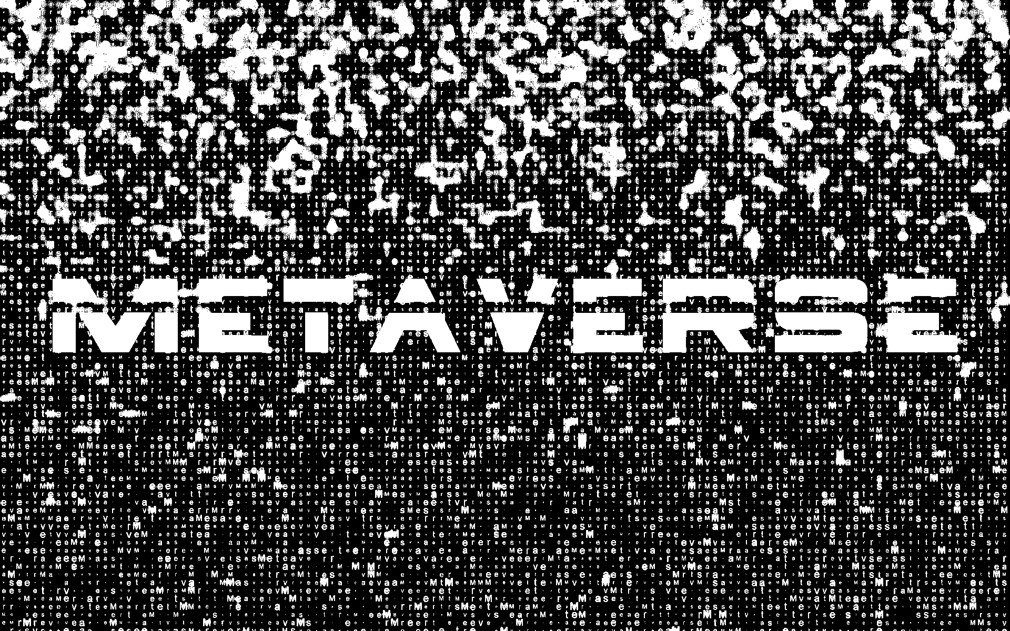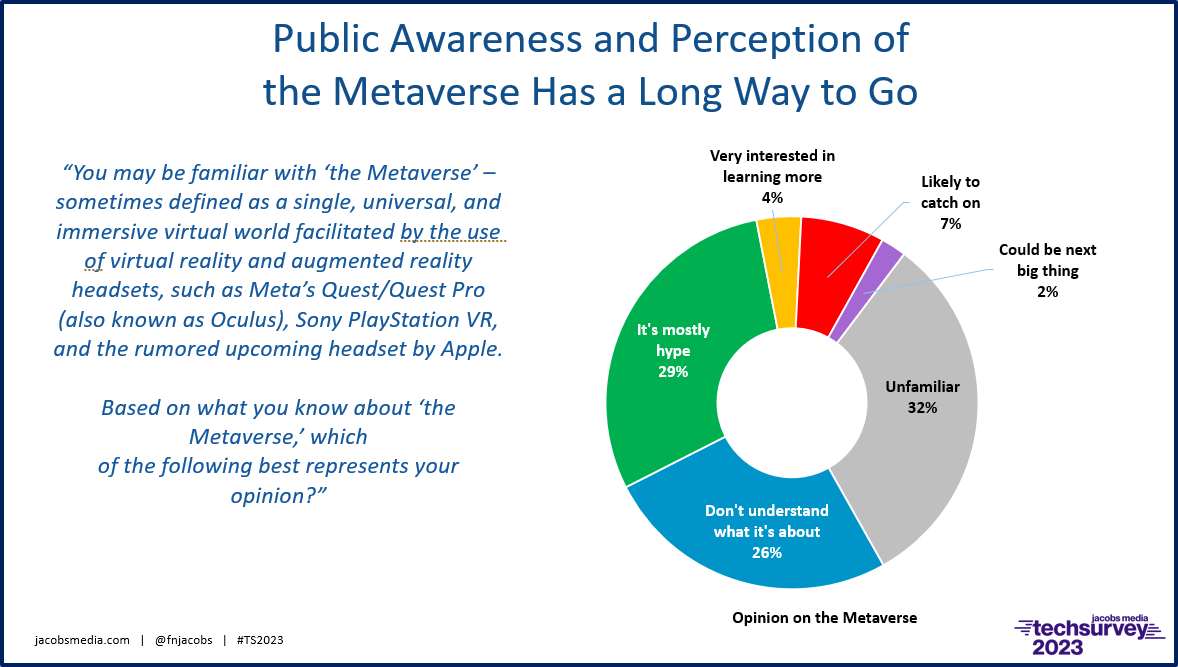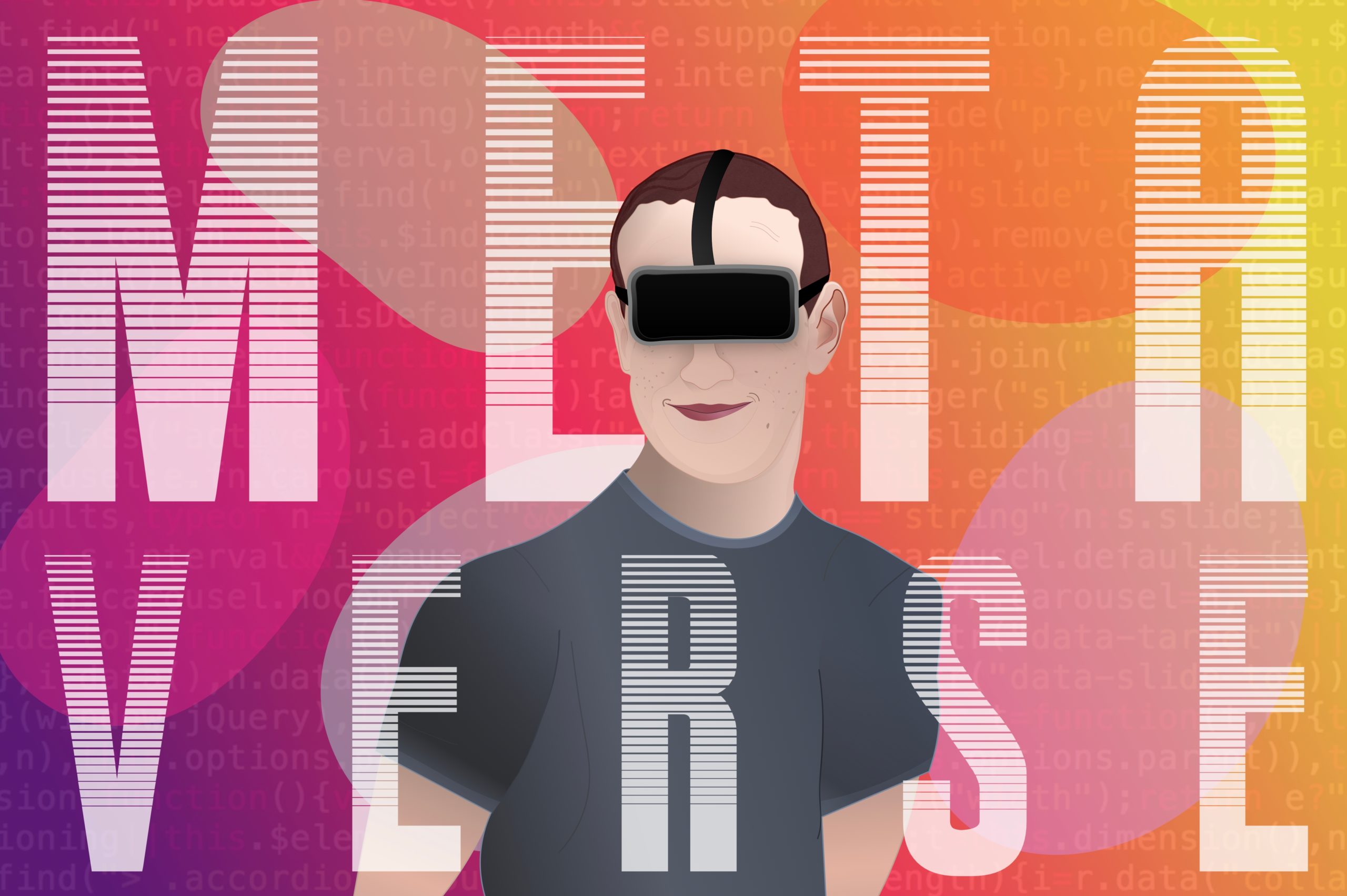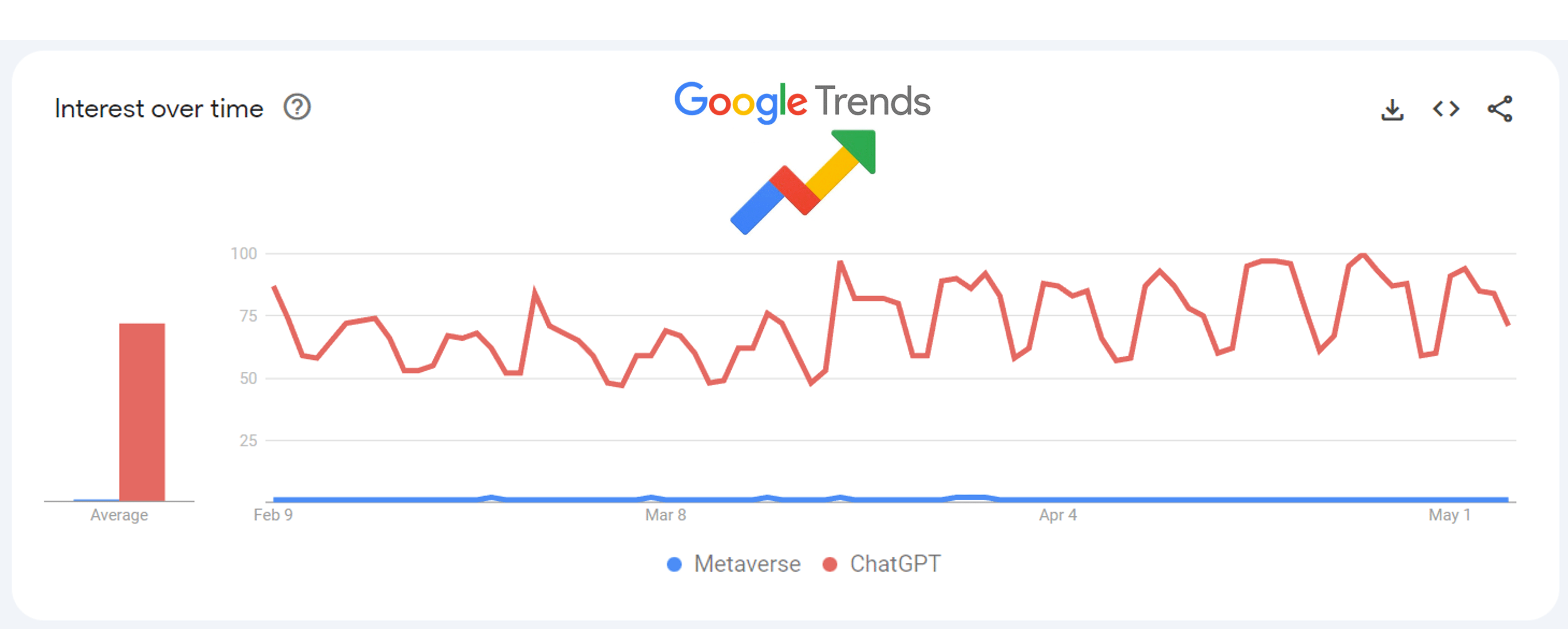
Given our insatiable appetite for news (and gossip and dirt), it doesn’t take us long to tire of people and stories that overstay their welcome.
Take George Santos. (Remember him?). He was the rage back in January, but now we might even begin to think about who he is because so much has gone down since he was making daily headlines. Jimmy Carter went into hospice back in mid-February and you were probably gearing for four days of funeral coverage. But apparently, he’s still in there and the world is waiting.
And then there’s the Metaverse, remember that? It was so hot that Mark Zuckerberg changed the name of his company to Meta more than a year ago. Now, he’s laying off thousands of workers. It looked like Zuck got a bit ahead of his skis, and now referring to 2023 as the Year of Efficiency – not a good sign. Wasn’t this supposed to be where our avatars would cruise into virtual stores and buy mass quantities of stuff using crypto?
 For a while there, the Metaverse was so hot that Metamucil, the fiber supplement that’s been around for nearly 90 years, hyphenated its name to jump on the Metaverse bandwagon. It is now being marketed by its current owners, Procter & Gamble as Meta-mucil.
For a while there, the Metaverse was so hot that Metamucil, the fiber supplement that’s been around for nearly 90 years, hyphenated its name to jump on the Metaverse bandwagon. It is now being marketed by its current owners, Procter & Gamble as Meta-mucil.
Meantime, while he was dithering with Oculus goggles, AI was coming up fast, and has lapped Meta’s Metaverse. While Zuck has made AI investments, he’s staked the company to the Metaverse, for better or for worse.
Sometimes techie things just don’t catch fire. As Apple can tell you, their finger on the pulse of what consumers wanted paid off in diamonds with the iPod, iPhone, and iPad. But their Watch has been a slog. After years of tinkering and tweaking, they appear to have righted their wearable, and have made much headway. Still, the Watch pales in comparison to the ubiquity of their aforementioned innovations. According to Techsurvey 2023, nearly three in ten (29%) of core radio listeners now own a wrist wearable, a heady gain from last year and an all-time high for this tech product. Apple, in particular, has stuck with the Watch, tweaking it toward the health, wellness, and fitness space.
Zuckerberg would love to have had that level of success for the Metaverse. But it appears he is unable to muster up the focus or the interest in a platform touted to be “as big as the Internet” just a few months back.
Not when people don’t even know what the Metaverse is, much less able to explain it to a work colleague or family member. From the beginning, the Metaverse has generated precious little buzz because the media can’t explain it either. And as for consumers, they’d rather talk about TikTok’s more interesting tech product that features addiction, vice, taboos, privacy loss, and ownership by America’s superpower nemesis, China. TikTok sounds more like a Marvel villain. The Metaverse is an obtuse, nebulous concept where people run around with funny goggles waving at things only they can see.
We took a measure of the Metaverse in our new Techsurvey 2023, and it produced a “meh” response from our massive respondent base. We did our best to describe it, and this is what we got back.

Only 13% show some interest in the concept. In fact, 2% think it could be “the next big thing.” But for the rest of the sample, nearly a third are simply unfamiliar with the Metaverse, one-fourth don’t understand it, while nearly three-in-ten believe it’s mostly hype – far from the ringing endorsement Facebook, Microsoft, Walmart, Disney, and other big tech and entertainment conglomerates have invested billions in.
Those who think the Metaverse is much ado about nothing have a compadre in Business Insider’s Ed Zitron. His article yesterday featured a headline much more inflammatory than my blog post title today:
“RIP Metaverse”
His story is worth reading, covering the innovations and pop culture markers that preceded Zuckerberg going gaga over the concept, while even rebranding his company in an attempt to be “first in” to this ill-defined space. And Zitron lays the blame at Zuck’s feet, noting all those rose-colored projections about the Metaverse were “built on the vague promises of a single CEO.” And the hype rolled on. As Zitron points out, CNBC’s Jim Cramer nodded when Zuck predicted 1 billion people would visit the Metaverse and spend lots of money there. And Gartner claimed a quarter of the population would spend at least an hour a day in this avatar infused playground by 2026. Not likely.
in” to this ill-defined space. And Zitron lays the blame at Zuck’s feet, noting all those rose-colored projections about the Metaverse were “built on the vague promises of a single CEO.” And the hype rolled on. As Zitron points out, CNBC’s Jim Cramer nodded when Zuck predicted 1 billion people would visit the Metaverse and spend lots of money there. And Gartner claimed a quarter of the population would spend at least an hour a day in this avatar infused playground by 2026. Not likely.
And while investment continued in the Metaverse, so did the media hype, making it all but impossible to turn away from a phenomenon that would most certainly become the logical extension of the Internet as we now know it.
But then earlier this year, the mass layoffs revolving around the Metaverse spread like a bad virus throughout companies that once were all-in. Disney and Walmart closed their Metaverse divisions. Soon, Facebook even took the Metaverse out of its sales kit.
Meantime, Zuckerberg is deep into the pivot to AI. In March, he declared his company’s (yes, it’s still named Meta) “single largest investment is advancing AI and building it into every one of our products.”
“Oh, Metaverse, we hardly knew ye”
Zitron minces no words, strongly suggesting Zuckerberg should be relieved of his duties, having blown through billions of dollars over a concept even he couldn’t explain. Zitron calls the Metaverse debacle “a damning indictment of everyone who followed hm, and anyone who still considers (Zuckerberg) a visionary tech leader.”

What can we learn about buzz – who has it and who’s lost it? My “Buzz-ometer” is Google Trends, the degree to which people use search terms to communicate what’s on their mind. Looking just at America, I compared “Metaverse” to “ChatGPT” for just the past 90 days. And that’s a story in and of itself. The AI explosion is a recent phenomenon, barely on many radar screens last Fall.
While Google doesn’t tell us what these numbers/levels represent in absolute number of searches, the comparison of the two can be telling. And that’s the case here, as we look at these two technologies side by side, mano a mano.

So what – if anything – have we learned as we now find ourselves in full swing with the “next big thing,” generative AI?
Sunday’s New York Times covered the latest ado around our current tech obsession. Dave Marchese pens (apparently without the assistance of ChatGPT) “How Do We Ensure an A.I. Future That Allows for Human Thriving?,” the story of how Gary Marcus – an entrepreneur and author in the space – is seriously worried the rapid proliferation of this technology will create an uncontrolled environment where “bad actors” will run wild.
Unlike the Metaverse, many people are able to comprehend the basics of this technology. Perhaps they’ve already seen it in action – on TV, in their office, or from their kids experimenting with it. My “Taylor Swift” cloned greeting at CRS back in March still elicits oohs and aahs from those in attendance. The Metaverse was a strange intangible. A.I. is anything but. It’s not hard to imagine how it will interface with and impact virtually every industry and job sector, as well as every facet of our lives.
Here’s the money question from the Times story:
“It seems as if people are easily able to articulate a whole host of serious, social, political and cultural problems that are likely to arise from the widespread use of GPT. But it seems much less easy for people to articulate specific potential benefits on the same scale. Should that be a huge red flag?”
But it seems much less easy for people to articulate specific potential benefits on the same scale. Should that be a huge red flag?”
And Marcus’ answer:
“The question is: Do the benefits outweigh the costs? The intellectually honest answer is that we don’t know.”
And yet, the radio broadcasting industry is totally abuzz over a technology even the technologists don’t fully comprehend. Marcus warns that we are rapidly moving to a zone where “the biggest benefit (of A.I.) is efficiency.” And while being more productive and doing it at a lower cost is most assuredly attractive to broadcast executives, this technology has the ability to “destroy the fabric of society.”
Last week on Apple’s earning call, its CEO – Tim Cook – was asked his opinion about the challenges and opportunities presented by A.I.
His response: “I think it’s very important to be deliberate and thoughtful in how we approach these things.”
Deliberate and thoughtful.
 I’m not hearing a lot of that when I talk with radio executives about A.I. technology. Instead, it’s more about how much money can we save, and how can we create content more efficiently.
I’m not hearing a lot of that when I talk with radio executives about A.I. technology. Instead, it’s more about how much money can we save, and how can we create content more efficiently.
No one is truly considering what it means to replace people – yes, even voicetrackers – with A.I. DJs. The rationale that many shifts are unmanned now so even robots playing songs is a step up doesn’t hold water.
We’re back to some of the same questions the industry has not confronted especially well with voicetracking. What do we do in case on an emergency, a death, or other unforeseen circumstances?
 In speaking with automotive executives these past few years about autonomous cars, many will tell you the technology is a better driver than a human 99% of the time. It’s that 1% that’s a challenge – safely navigating the driver and passengers through an anomalous incident the computers could not anticipate. That’s when cars crash and people die.
In speaking with automotive executives these past few years about autonomous cars, many will tell you the technology is a better driver than a human 99% of the time. It’s that 1% that’s a challenge – safely navigating the driver and passengers through an anomalous incident the computers could not anticipate. That’s when cars crash and people die.
We know from our many Techsurveys that emotions play a growing role in how listeners connect with talent. Emotional intelligence isn’t exactly a strong suit of A.I.
How will listeners react to artificial DJs and hosts? Will they marvel at the technology’s ability to replicate human delivery? Or will they continue to write off radio as a medium that doesn’t believe in the “listener first” mindset. Or even third. Or fourth.
Has anyone done any research on the subject of robot DJs? Where does the audience stand? Do they know and do they care?
Up against prerecorded podcasts and nameless, faceless playlists, live talent on the radio is one of the last vestiges of media humanity.
Until it isn’t.
As A.I. technology rolls like a tidal wave over the radio industry, it’s all subject to change.
Be careful of the undertow.
It’s going to be a wild ride, to be sure. You might want to take a little Meta-mucil.
- The Exponential Value of Nurturing Radio Superfans - April 28, 2025
- What To Do If Your Radio Station Goes Through A Midlife Crisis - April 25, 2025
- A 2020 Lesson?It Could All Be Gone In A Flash - April 24, 2025




Over-leveraged owners who are bleeding revenue will adopt AI in a heartbeat in an attempt to “cut their way to prosperity.” How did that work for Clear Channel (now iHeartRadio) or Citadel (now Cumulus)? How’s it working for now Audacy (formerly Entercom)? “You realize what this means? It means bankruptcy and scandal and prison!” Well, maybe not prison. Too many platinum parachutes instead for the people who created the problem.
Some of the resulting companies are doing OK, with a lot less leverage. Listeners aren’t doing as well because the process cut into the bone, sucked out the marrow, and left a handful of people trying to retain some semblance of the “radio that was.” The trackers and syndicators are trying to hang on in a business they (mostly) love, but they can’t really focus locally or in the moment, and listeners are either consciously or subconsciously aware of it. Radio has become the generic brand of content delivery with a high cost of commercial load.
Perhaps we should ask ChatGPT how to fix the problems.
Tim Cook’s words in the post are worth remembering and repeating, Brian: “Deliberate and thoughtful.”
I mentioned the metaverse-related launch from Portugal’s RFM soon after it happened, but it appears that it might already be abandoned. At the very least, it’s not being conspicuously promoted now.
Spare me the AI dj’s.
Correct me if I’m wrong but anyone who worked a part-time air shift on the weekends did it for the love of the job, and not the money. I thought just popping for a double cheeseburger meal on the way home was luxurious.
To quote 80’s Zen philosopher Jeff Spicoli “righteous bucks!”
I think it’s easy to get on the ‘Metaverse is dead’ dogpile but a bad website doesn’t mean the Internet is a bad thing. It’s a great idea they haven’t figured out how to implement yet. And as we know, content matters. Facebook fumbled it, but someone else will pick up the ball. I actually believe radio can be the winner here. A station Metaverse delivering location based experiences to listener devices, with meaningful content we know the audience wants and appreciates, will bring depth and interesting opportunities. Who better to take advantage of the digital space in their physical territory than local radio?